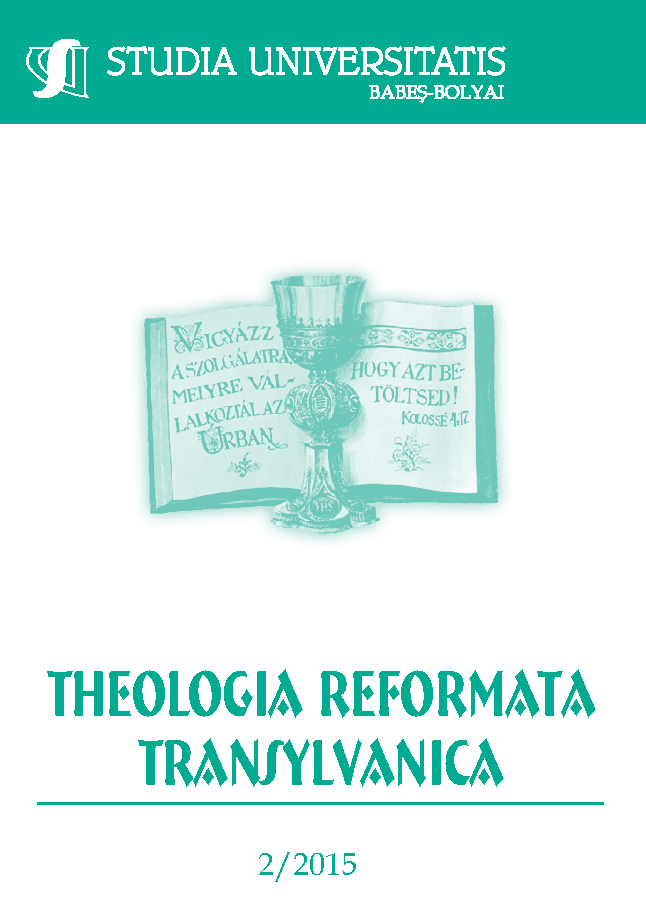Vladimir Jankélévitch "megbocsátás" fogalma Jacques Derrida értelmezésében
Keywords:
forgiveness, gift, lapse, the unforgivable, collective sin, personal responsability, relief, reconciliation, public apologyAbstract
The notion of forgiveness by Vladimir Jankélévitch in the interpretation of Jacques Derrida. One of the dominant subjects of the Parisian millennial philosophical thought is the problem of forgiveness, including both its personal and social-historical aspects. Vladimir Jankélévitch, Paul Ricoueur and Jacques Derrida are three significant thinkers deeply engaged in the question. Our paper summarizes the thought of the latter author, in special regard to Jankélévich’s point of view. The uniqueness of Der- rida’s angle lays in its one-sided emphasis on the unconditionality of forgiveness, as well as the paradox saying that “only the unforgivable can be forgiven”. Hence on one hand in his analysis, the Christian teaching on forgiveness is not pliable enough, while on the other hand, his own fundamental view obstructs him from reading the writings of Jankélévitch with more sense and sensitivity. After the WWII, Derrida moves to France as a juvenile. Although he has a Jewish family background, he is not affected directly – through the death of his loved ones or in his own body – by the destruction of madness. Possibly this is the source of the distanced and objective as- pect of his analysis, which sometimes easily turns into the pliability of linguistic and mental game, or into a light arbitrariness. As opposed to Jankélévitch’s writing, this is not one soaked with blood and smoke, not even when it talks about the holocaust. Typically to his work, instead of beginning with the list of dreadful historical events, which need to be forgiven, he begins with linguistics: with the indication, that unlike in Greek, in Latin languages there is a clear etymological connection between gift and forgiveness: don and pardon are two inseparable words.
Kivonat
Az ezredforduló párizsi filozófiai gondolkodásának egyik meghatározó témája a megbocsátás problémája, mind személyes, mind pedig társadalmi-történelmi vonatkozásai. Három jelentős gondolkodó: Vladimir Jankélévitch, Paul Ricoueur és Jacques Derrida is elmélyülten foglalkozik a kérdéssel. Írásunk ez utóbbi szerző gondolatait foglalja össze, különös tekintettel Jankélévitch szemléletéhez való viszonyában. Derrida látásmódjának sajátossága, hogy egyoldalúan hangsúlyozza a bocsánat feltétel nélküliségét, illetve azt a paradoxont, mely szerint „csak a meg- bocsáthatatlant lehet megbocsátani”. Ezért találjuk úgy, hogy elemzésében egyrészt a bocsánatról szóló keresztény tanítás nem eléggé árnyalt, másrészt pedig, hogy alap- szemlélete akadályozza abban, hogy Jankélévitchet érzőbben és értőbben olvassa. Derrida a második világháború után fiatalemberként telepszik le Franciaországban, zsidó családi háttérrel ugyan, anélkül azonban, hogy közvetlenül, szerettei halálá- ban vagy saját testében érezte volna az őrület pusztítását. Talán innen van az, hogy szövege távolibb, hűvösebbnek és tárgyilagosabbnak tűnő elemzés, ami helyenként könnyen fordul át a nyelvi és gondolati játék árnyaltságába, olykor pedig könnyed öncélúságába. Ez nem vérrel és füsttel átitatott szöveg, mint a Jankélévitché, még akkor sem, ha a holokausztról beszél. Jellemző például, hogy ez a bocsánatról szöveg nem a történelem megbocsátani való iszonyú hordalékával kezdődik, hanem a nyelv- vel: az arra való utalással, ahogyan a görögtől eltérően, a latin eredetű nyelvekben az ajándék és megbocsátás között nyilvánvaló az etimológiai kapcsolat: a don és pardon egymástól elválaszthatatlan.
Kulcsszavak: bocsánat, ajándék, elévülés, a megbocsáthatatlan, kollektív bűn, egyéni felelősség, jóvátétel, megbékélés, nyilvános bocsánatkérés
References
DERRIDA, Jacques: Pardonner. L’impardonnable et l’Imprescriptible. Editions Galilée, Paris, 2012.
HANSEL, Joelle: Jankelevitch une philosophie du charme. Éditions Manucius, Paris, 2012.
JANKÉLÉVITCH, Vladimir: L’imprescriptible. Pardonner? Dans l’honneur et la dignité. Éditions du Seuil, Paris, 1986.
JANKÉLÉVITCH, Vladimir: Le Pardon, in: Jankélévitch, V. – Schwab, F. (ed.): Philosophie morale, Flammarion, Paris, 1998. 993–1149.
JANKÉLÉVITCH, Vladimir: Philosophie premiere. Presses Universitaires de France, Paris, 1953. (reprint: Paris, 3eme edition Quadrige/PUF, 2011.) LEMCKE, V.: Der Begriff Verzeichen bei Vladimir Jankélévitch. Würzburg, Königshausen-Neumann, 2008.
LUBRINA, J. J. – COPHIGNON, A.: Vladimir Jankélévitch. Les derniéres traces du maitre. Editions du Félin, Paris, 2009.
MATTÉI, Jean-Francois: De l’indignation. La Table Ronde, Paris, 2005.
MONTMOLLIN-ROULET, Isabelle: Vladimir Jankélévitch, Philosophe du Voyage.
Université de Lausanne – Faculté des lettres, Lausanne, 1999. TILLIETTE, Xavier: Une kitiége de l’áme. L’étique de Vladimir Jankélévitch. In: 75
Vladimir Janélévitch. L’ARC 21/75, 1979.
Downloads
Published
How to Cite
Issue
Section
License
Copyright (c) 2015 Studia Universitatis Babeș-Bolyai Theologia Reformata Transylvanica

This work is licensed under a Creative Commons Attribution-NonCommercial-NoDerivatives 4.0 International License.



